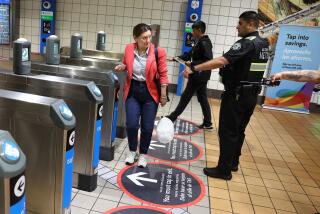Runaways Leave Trip Home to Trailways
- Share via
DALLAS — At 16, Tina Lane ran away from her Indianapolis home, only to end up working nine-hour days in a fast-food restaurant, barely making ends meet and unable to afford bus fare home.
But she got back to her family, one of 4,000 youths in the last year who took advantage of Trailways Inc.’s free trips home for runaways.
“I’d probably still be working to earn bus fare home,” Tina said.
The Dallas-based bus line started its “Operation: Home Free” on June 7, 1984. The company said it is transporting an average of 14 runaways a day back home.
‘Dynamic Impact’
Trailways spokesman Roger Rydell said the free-ticket program is a community relations project that has had a “dynamic impact.”
Troy Slover, 17, left home with a friend unaware that the van they were driving had been stolen.
“I wanted to go across the states and see how the world was. I got tired of home,” said Troy, who was arrested with his friend in Arizona. Police contacted his father in Sacramento and offered Troy a free Trailways ticket home.
“I was trying to figure out how I was going to get home without money,” he said. “They came and got me at the (juvenile) center and told me about the ticket. When I got off the bus in Sacramento, I ran straight for my dad.”
The idea for “Operation: Home Free” was fostered by a Bridgewater, N.J., police captain who had spent 15 years working with runaways.
Capt. Richard Voorhees, 47, said he came up with the idea after he attended a conference that featured John Walsh, father of Adam Walsh, whose abduction and death were the basis for the television movie “Adam.”
“He blasted the police,” Voorhees said of Walsh. “He said we weren’t taking reports of missing children seriously.”
Three days after writing Trailways officials urging them to help design a comprehensive plan to assist runaways, Voorhees said he received an enthusiastic response from the bus line.
Verified as Missing Persons
The biggest obstacle was finding a way to confirm children as runaways, Rydell said. But Voorhees introduced Trailways to the International Assn. of Chiefs of Police, which maintains a national registry of people reported missing.
Within four weeks, Rydell said, Trailways launched the operation.
Rydell said the average runaway using the program is 14. The youths, who come from varying socioeconomic backgrounds, most often are headed for California, the Southwest or Florida.
When runaways turn themselves in to police, they are verified as missing persons, their parents are informed and they are accompanied to one of 12,000 Trailways terminals. The only paper work, Rydell said, is a form police must sign at the bus station for the runaway to receive a free ticket home.
With 1.5 million children reported missing a year, Rydell said, there is still a need to increase awareness of the program. During the next year Trailways will launch a nationwide “spread the word” campaign producing posters and broadcast public-service announcements.
More to Read
Sign up for The Wild
We’ll help you find the best places to hike, bike and run, as well as the perfect silent spots for meditation and yoga.
You may occasionally receive promotional content from the Los Angeles Times.






